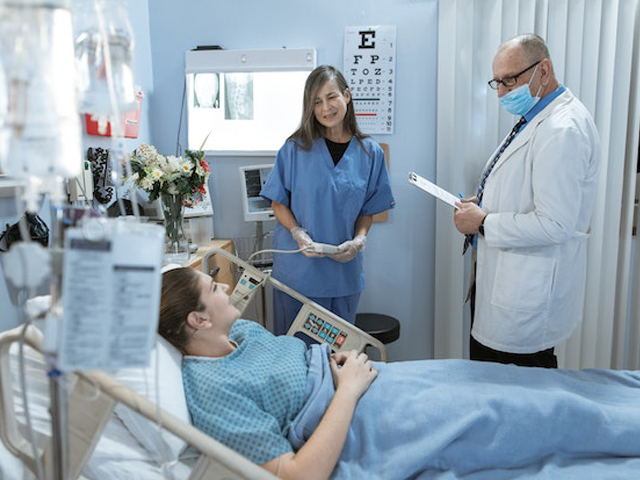
If you’re considering a career in nursing, you may be wondering - what makes someone a good nurse?
Needless to say, there are certain personal qualities some individuals innately possess that make them natural caregivers. But, becoming a nurse is more than this! You also need to develop specific professional skills to succeed in your nursing career. Fortunately, these skills can be acquired through a combination of higher education and professional training.
To learn more about how to become the best possible nurse you can be - just read on!
Completing an Accredited Nursing Qualification
One of the most important ways to become a registered nurse is to complete an accredited nursing qualification at your preferred tertiary education provider of choice. You could enrol to complete an Accelerated Bachelor of Science in Nursing, or ABSN for short.
As part of this kind of degree, students are required to undertake both core and elective study units - which can typically include areas of focus such as, for example, introductory foundations to nursing, pharmacology, pathophysiology, mental health, paediatrics, community health, and women’s health, to name a few! Once ABSN students graduate with their nursing qualification, they can then choose to enter into specific areas of specialisation. These specialisation streams can involve delving deeper into neonatal nursing, for example, or even surgical nursing, geriatric nursing, or oncology nursing specifically.
The best thing about an online ABSN course is that you can complete it via distance or remote study methods. Of course, being a successful online student is not always easy! It can be isolating, and the student is almost completely reliant on themselves to be disciplined and accountable to their coursework requirements. An online student is also responsible for managing their workload remotely, as well as having digital access to the online course material. Of course, that is not to say that online and remote students do not have the virtual support of their teaching staff and fellow students! Indeed, recent advances in virtual video conferencing programs - such as Zoom, for example - have meant that online classes can be conducted remotely. To attend, remote students simply need to have digital access to the video conferencing program, as well as be able to access the online student portal - which is usually where all important course information and messaging is stored and located.
Developing Relevant Professional Skills

As well as completing a relevant accredited tertiary qualification in nursing, to become a registered nurse, there are also certain professional skills an individual needs to develop. Some of these skills include:
Strong Communication and Collaboration Skills
Strong communication and team collaboration capabilities are central aspects of being a successful nurse. Indeed, being in professional healthcare involves being part of a team of medical staff who work collaboratively together to achieve common goals. As such, good communication skills are essential to succeed in your nursing career.
Effective Time Management and Organisation Skills
Time management and organisation skills are also very important to be a competent nurse. Fortunately, these skills can be developed during your tertiary studies. As a student, you need to be organised and manage your time effectively to stay on top of your study workload. To do this, many students find it extremely helpful to use time management and productivity apps. Some of the best productivity apps for students include Evernote, Wunderlist, and Google Calendar - just to name a few!
Precision, Thoroughness and Attention to Detail
Being able to work with precision and having impeccable attention to detail are also essential when you are a registered nurse. Making mistakes when it comes to the health and well-being of the patients in your care can be disastrous, and in some cases, even fatal! As such, being thorough, attentive and precise when reading patient charts, administering medications, and analysing lab results is extremely important.
Cultivating Specific Personal Attributes
As well as developing the professional skills that are essential to succeed in your role as a registered nurse, there are also specific personal attributes, qualities and characteristics that should be cultivated. Of course, some of these qualities are innate to certain individuals. So, if an individual already displays certain characteristics, this may indicate that - with the proper training and education - they may be well suited to a career in nursing. Some of the personal qualities and characteristics aspiring nurses should endeavour to cultivate include:
Compassion, Care and Empathy
As a nurse, your primary role is to be a caregiver to your patients. As such, if you are innately caring, empathetic, and nurturing, a nursing career may be the right fit for you. Of course, you also need to be able to be compassionate. At times, your patients may be in a weakened or compromised state, and you need to be able to treat them with respect, dignity and compassion.
Endurance, Strength, and Resilience
Being a nurse is not easy! It is fast-paced, physically exhausting, and can also take an emotional toll on the individual. As such, an aspiring nurse needs to develop both physical endurance, as well as emotional strength. They also need to be resilient! As a nurse, every day brings with it a new challenge, and you need to be able to cope with the stress of your role.
Dedication, Drive and Commitment
Sadly, often, a career in nursing can be a somewhat thankless job. Long hours, relatively low pay, and a stressful working environment can cause burnout. As such, nursing staff need to be dedicated, driven and committed to their cause. The best way to maintain this outlook is to remind oneself of the rewarding and inspiring aspects of the role, as well as the huge impact you are making in the lives of your patients and their loved ones.
Once you have completed your nursing qualification, your ability to succeed in your nursing career is also dependent on the professional skills and personal qualities you have developed and cultivated. Significantly, the professional skills and training acquired during higher education studies can complement the natural abilities a budding nurse will often already display.
Indeed, it is a combination of each of these elements that will, in the end, make a good nurse!











